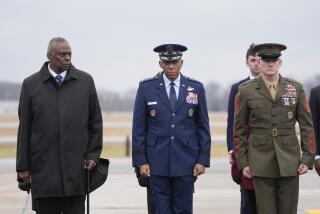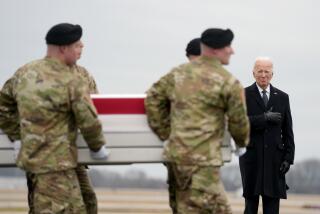Bomb Kills 10 Marines at Fallouja
BAGHDAD — Ten Marines were killed and 11 wounded as a powerful makeshift bomb exploded near Fallouja in the deadliest insurgent attack on American troops in Iraq in almost four months, the Marine Corps said Friday.
The deaths of four more U.S. troops were announced Friday, bringing to 18 the number of American servicemen killed in Iraq since Wednesday.
The Fallouja blast Thursday evening was produced by a device fashioned from several large artillery shells, according to a Marine statement. It disrupted a period of relative calm in a city that was a symbol of American failure early in the war and an insurgent stronghold until a Marine-led assault just over a year ago.
With Iraqis scheduled to elect a new parliament Dec. 15, the attack reinforced the expectation of stepped-up violence aimed at disrupting the vote. It also came at a politically sensitive time in the United States, where the Bush administration is under pressure to reduce the number of U.S. troops in Iraq.
The Pentagon said the Marines killed at Fallouja were on foot but it provided no details of their mission or the attack. A police official in Fallouja, 35 miles west of Baghdad, said the Marines had been searching for bombs just outside the city. A Pentagon official quoted by the Reuters news agency said the bomb went off in a factory courtyard.
It was not known how the bomb was detonated, and there was no immediate claim of responsibility.
Makeshift bombs, which the Pentagon calls improvised explosive devices, or IEDs, are the insurgents’ most lethal weapon, accounting for 60% of U.S. troop fatalities since August.
Thursday’s blast, which police said occurred two miles west of town, was the deadliest for U.S. forces in Iraq since 14 Marines and a civilian interpreter were killed Aug. 3 by a roadside bomb near Haditha. The force of that attack ripped through their lightly armored personnel carrier, causing it to flip into the air and explode.
The troops killed at Fallouja were with Regimental Combat Team 8 of the 2nd Marine Division based at Camp Lejeune in North Carolina. The Marines said that seven of those wounded had returned to duty and their unit was still conducting counterinsurgency operations in and around Fallouja.
Hours later, the Arabic-language television channel Al Jazeera broadcast a videotape and statement in which insurgent kidnappers holding four Christian peace activists -- two Canadians, a Briton and an American -- threatened to kill them by Thursday unless all prisoners in U.S. and Iraqi detention centers were released.
The other U.S. military deaths announced Friday were those of three soldiers with the 48th Brigade Combat Team killed in a traffic accident south of Baghdad and a soldier assigned to the 2nd Marine Division who died of injuries suffered in a rocket attack near Ramadi.
That city is the capital of Al Anbar province, which includes Fallouja and is a center for Sunni Muslim Arab insurgents opposed to the American presence and the U.S.-backed Iraqi government, which is led by Shiite Arabs and ethnic Kurds.
At least 2,124 U.S. service members have died since the start of the war in 2003.
Facing pressure to bring 160,000 troops home from Iraq, President Bush vigorously defended his policy Wednesday. He acknowledged the “uneven” performance of Iraqi troops but said improvements in their training would enable them gradually to assume the burden of the fighting.
Gen. Martin Dempsey, the U.S. commander in charge of their training, said Friday that 225,000 Iraqi soldiers and police officers would be operating during the Dec. 15 election, nearly double the 130,000 fielded in January when Iraqis elected the provisional National Assembly.
As in previous sweeps of Al Anbar since the spring, Iraqi troops joined U.S. forces Wednesday in an operation against insurgent hide-outs in the city of Hit. But the Iraqis’ involvement has not diminished the death toll among U.S. troops. Ninety-six lost their lives in October, the fourth-highest monthly toll of the war, and at least 85 died in November.
A recent assessment of Prime Minister Ibrahim Jafari’s tenure, which was compiled by his office and reported Friday by Associated Press, said insurgent attacks “have continued to rise.” The Iraqi armed forces and police “need to become more effective,” it said, before they can meet “these huge challenges.”
Thursday’s lethal attack near Fallouja appeared to undermine an American assertion that recent military sweeps in western Iraq were proving effective.
The operations have been aimed at cutting off the flow from Syria of foreign fighters, money, explosives and other weapons. Although U.S. military officials agree that most insurgents are Iraqis, foreign fighters loyal to Jordanian militant Abu Musab Zarqawi are said to play a prominent role in the larger, more lethal attacks.
Maj. Gen. Rick Lynch, a senior military spokesman in Baghdad, said this week that the number of makeshift bombs that either exploded or were discovered and cleared fell from 1,869 in October to 1,329 last month. He called the drop “a direct result of the effectiveness of our operations.”
On Friday, officials with Iraq’s Interior Ministry said it had banned all non-Iraqi Arabs from entering the country until further notice. They characterized the decision as a pre-election security measure.
The Fallouja bombing was among the most lethal incidents involving U.S. troops.
In January, 30 Marines and one sailor were killed in western Iraq when their helicopter crashed in bad weather. Last December, a suicide bombing in a mess tent near Mosul killed 14 U.S. soldiers and eight others. In November 2003, three downed helicopters in two incidents claimed the lives of 33 American soldiers.
White House spokesman Scott McClellan said of Thursday’s attack, “We are saddened by the loss of life, whether it’s one soldier who loses his or her life, or 10 or 11, we are saddened to hear that news.”
Bush was informed of the attack but did not mention it at a morning Rose Garden appearance to announce positive economic developments. The U.S. casualties were disclosed after that event. McClellan said later that the two issues were separate.
Sen. John W. Warner (R-Va.), chairman of the Senate Armed Services Committee, said the attack illustrated a “very serious situation.”
“It appears that this group of Marines had collected, which is always a dangerous thing, in ... one location,” Warner said after a closed-door meeting with Pentagon officials called to discuss another topic. “And the location has been one that they felt was perfectly safe. I presume it was in an area which had been screened and cleared by operations.”
Thousands of American troops are in or near Fallouja. Unmanned aerial drones monitor the city day and night. Marine convoys shuttle between Camp Fallouja, about 12 miles from town, and a small outpost within the city that serves as police headquarters, City Hall and a convention center.
The city became a symbol of America’s early failings in the war when insurgents held the town for much of 2004, turning it into a control center for kidnappings and car bombings throughout the region.
U.S. forces captured the city in November 2004 in the biggest battle since the toppling of Iraqi President Saddam Hussein in April 2003. For more than a year, the U.S. military and the Iraqi government have been rebuilding Fallouja, which has a functioning city council and a police force made up of local men.
In recent months, insurgents had lowered their profile in Fallouja, although a Marine died of wounds from small-arms fire during combat in the city on Wednesday.
Marines say the insurgent cells still in the city are probably made up of local Sunnis opposed to U.S. forces and Iraqi government troops, who are mostly Shiites from elsewhere in Iraq. Falloujans say members of Zarqawi’s group lurk in villages just outside the city.
U.S. commanders have expressed concern about the increasing use of more powerful and sophisticated improvised bombs.
A Pentagon task force launched in 2004 developed technologies to lessen the threat, such as equipping soldiers with electronic devices to detonate the bombs before they could harm U.S. personnel.
But the insurgents have been able to build bigger, more powerful bombs capable of shredding military vehicles’ armor and destroying 5-ton trucks.
Insurgents also have figured out how to detonate explosives in ways that elude electronic jamming, which is designed to block the signals that set off roadside bombs. In some cases, guerrillas have given up on wireless devices such as cellphones or garage-door openers, instead rigging long wires to the bombs and setting them off by hand from safe distances.
The Pentagon recently said it was planning a larger task force, headed by a high-level general who would try to tap other U.S. agencies, businesses and academia for ideas on addressing the problem. The group has not been formed and the leader has yet to be appointed.
Times staff writers Mark Mazzetti in Washington and Doug Smith in Los Angeles and a special correspondent in Al Anbar province contributed to this report.
More to Read
Sign up for Essential California
The most important California stories and recommendations in your inbox every morning.
You may occasionally receive promotional content from the Los Angeles Times.









